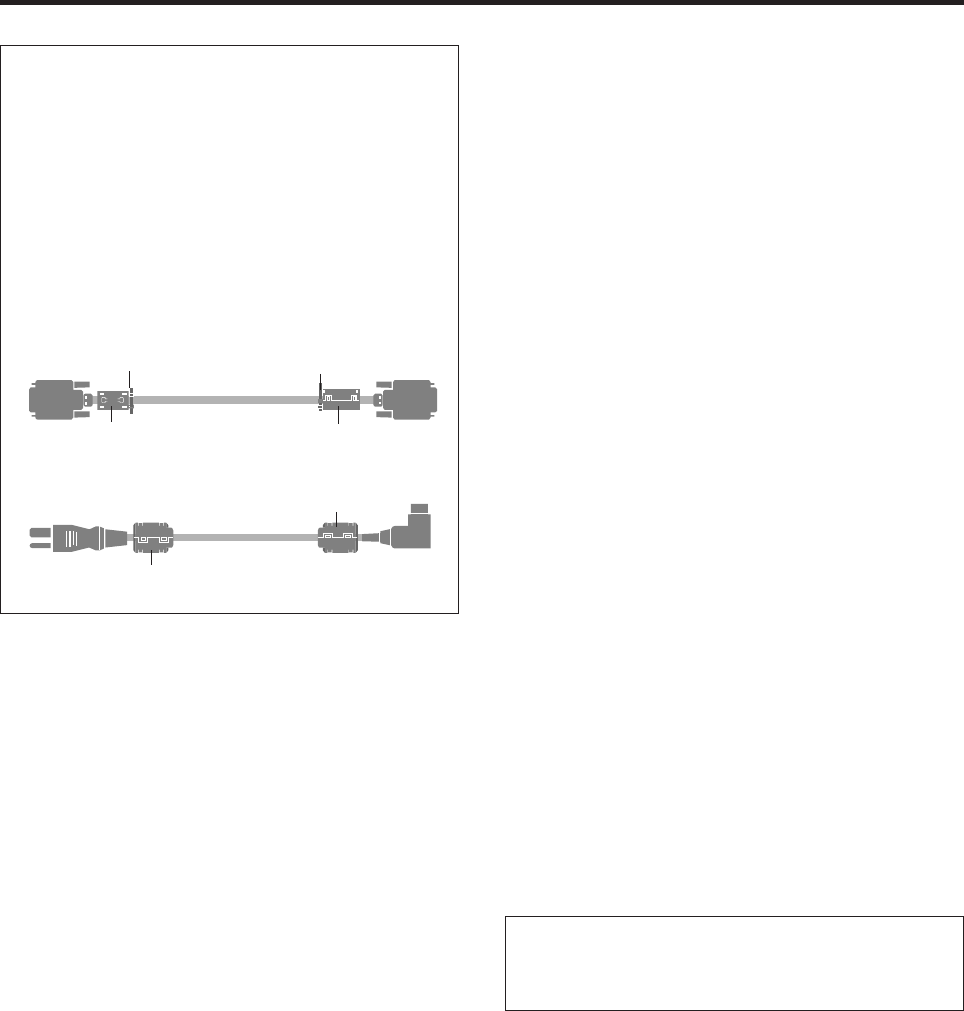
NOTE:
When you connect a computer to this monitor, attach the
supplied ferrite cores. If you do not do this, this monitor
will not conform to mandatory FCC standards. Attaching
the ferrite cores:
Set the ferrite cores on both ends of the
MONITORLINK™ cable (not supplied), and both ends
of the power cable (supplied).
Close the lid tightly until the clamps click.
Use the band to fasten the ferrite core (supplied) to the
MONITORLINK™ cable.
MONITORLINK cable (not supplied)
core
(
small
)
core
(
small
)
Connecto
r
band
band
Power cable (supplied)
core (large)
core (large)
To avoid damage and prolong operating life:
1. Use only with 120V 50/60Hz AC power supply.
Continued operation at line voltages greater than 120 Volts
AC will shorten the life of the unit, and might even cause
a fire hazard.
2. Handle the unit carefully when installing it and do not
drop.
3. Set the unit away from heat, excessive dust, and direct
sunlight.
4. Protect the inside of the unit from liquids and small metal
objects. In case of an accident, unplug the unit and have
it serviced by an authorized Mitsubishi Service Center.
5. Do not hit or scratch the panel surface as this causes flaws
on the surface of the screen.
6. For correct installation and mounting it is strongly
recommended to use a trained, authorized Mitsubishi
dealer.
7. Only use tabletop stands or wall-mount brackets that are
designed specifically for this product.
8. As is the case with any phosphor-based display (like a
CRT monitor, for example) light output will gradually
decrease over the life of a Plasma Display Panel.
Recommendations to avoid or minimize uneven phosphor
aging:
Like all phosphor-based display devices and all other gas
plasma displays, plasma monitors can be susceptible to
uneven phosphor aging under certain circumstances. Certain
operating conditions, such as the continuous display of a static
image over a prolonged period of time, can result in uneven
phosphor aging if proper precautions are not taken. To protect
your investment in this Mitsubishi plasma monitor, please
adhere to the following guidelines and recommendations for
minimizing this type of damage:
* Do not turn off ORBITER.*
* Always enable and use your computer’s video game or
DVD player screen saver during use with these sources.
* Display a moving image whenever possible.
* Change the position of the menu display from time to time.
* Always power down the monitor when you are finished
using it.
If the plasma monitor is in long term use or continuous
operation, take the following measures to reduce the
likelihood of uneven phosphor aging:
* Do not turn off ORBITER.*
* Lower the Brightness and Contrast levels as much as
possible without impairing image readability.
* Display an image with many colors and color gradations
(i.e. photographic or photo-realistic images).
* Create image content with minimal contrast between light
and dark areas. Use complementary or pastel colors
whenever possible.
* Avoid displaying images with few colors and distinct,
sharply defined borders between colors.
NOTE:
Uneven phosphor aging/burn-in is not covered by the
warranty.
Contact Mitsubishi at 1-800-332-2119 for other
recommended procedures that will best suit your particular
application needs.
*ORBITER - Uneven phosphor aging/burn-in reduction feature. To minimize the risk of uneven phosphor aging/burn-in
when displaying still images, the Mitsubishi PD-5030 and PD-6130 offers a built-in feature known as ORBITER. The
ORBITER feature intermittently shifts the screen image horizontally and vertically in small increments. This intermittent
screen movement is usually not evident in full motion video. In some instances the ORBITER shift might be evident
while displaying static guides or menus. The default setting for ORBITER is On (AUTO1). Mitsubishi chose this setting
to help reduce uneven phosphor aging. Please do not shut the ORBITER off. For more information regarding ORBITER,
see page 26.


















